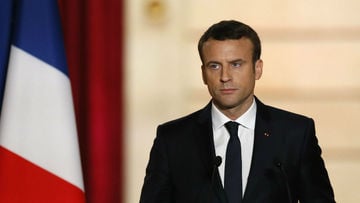Keeping Your Refugees: President Macron and Euro-African Relations

Ties between Europe and Africa have never been rosy. A relationship based on predatory conquest and the exploitation of resources (slave flesh, minerals, and such assortments) is only ever going to lend itself to farce and display rather than sincerity. The late Colonel Muammar Gaddafi, whose death must be placed squarely at the feat of the Franco-Anglo-American intervention in the Libyan conflict of 2011, typified the cruelly distorted relationship, a man who morphed from erratic, third way statesman of revolution to terrorist inspired “Mad Dog”; then to a modern, if cartoonish figure capable of rehabilitating a state from pariah to flattered guest.
A neat expression of Euro-African ties was captured in the 2007 Dakar address by then French President Nicolas Sarkozy. Like the current French President Emmanuel Macron, Sarkozy wanted to make an impression on those in what had been formerly characterised as the Dark Continent. The leaders of the Maghreb and West Africa had been led to believe that promise was wafting in the air, that France would have a grand update on its relationship with former colonies on the continent. The system of Francafrique, larded with neo-colonial connotation, would be scrapped. Sweet sensible equality would come to be.
An impression he did make, albeit in spectacularly negative, sizzling fashion.
“The tragedy of Africa is that the African has not fully entered into history… They have never really launched themselves into the future.”
Sarkozy’s speech seemed a cribbed version of texts produced at a time when European officials were falling over each in other in acquiring, and renting portions of the continent. But in 2007, a French leader could still be found speculating about the limited world view of African agrarianism, its peasantry cocooned from enlightenment.
“The African peasant only knew the eternal renewal of time, marked by the endless repetition of the same gestures and the same words.”
This, for the French President, was a “realm of fancy – there is neither room for human endeavour nor the idea of progress.”
The impact of the speech was such as to prompt Senegal’s foremost scribe Boubacar Boris Diop to suggest a cognitive confusion of some scale.
“Maybe he does not realise to what extent we felt insulted.”
Defences were offered in France, one coming from Jean-Marie Bockel. The speech, he concluded, had one thread through it:
“the future of Africa belongs firstly to the Africans.”
And so now, in 2018, where history has again become an issue, throwing up its human cargo of suffering from conflict, poverty and strong shades of neo-colonialism, France, fashioned as a European leader, again finds itself considering how to respond to relations with the southern continent.
For various African states, the signs are not good. Historical condescension and the sneer seemingly persists. Macron, in an effort to steady the refugee control effort in the European Union, has gone into full school teacher mode. The EU, he has iterated, cannot take decisions on behalf of African states, though he does suggest that, “Helping Africa to succeed is good for Europe and France.”
African states also suffered from a distinct problem of fecundity: unplanned population growth threatened further northward migration. Immigrant processing centres in North Africa designed to halt the flow into Europe’s south, he suggests, “can fly, just if some African governments decide to organise it”.
*
Dr. Binoy Kampmark was a Commonwealth Scholar at Selwyn College, Cambridge. He lectures at RMIT University, Melbourne. He is a frequent contributor to Global Research and Asia-Pacific Research. Email: [email protected]

